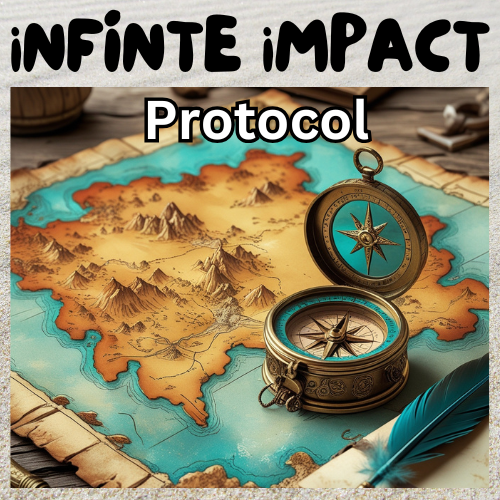Escaping the Illusion of Security to Redefine Success on Your Own Terms
#Post-Crisis Reconstruction Protocols
Introduction
A penthouse suite, the kind where the city lights twinkle like a million tiny, envious eyes. Inside, a gathering of the usual suspects – the ones with the tailored suits that probably cost more than most people’s monthly rent, the watches that could fund a small nation, and the air of quiet accomplishment. And amongst them, there’s a woman, let’s call her Eleanor. Eleanor, who, by all accounts, has “made it.” She’s the VP of something ridiculously important, her name whispered in boardrooms, her calendar a symphony of back-to-back meetings and power lunches.
As she sips her exorbitantly priced champagne, her gaze drifts to the panoramic view, and a flicker of something… well, something decidedly un-champagne-like crosses her face. It’s a strange look, an unexpected one. The look of someone who’s climbed the highest mountain, only to find the view… surprisingly beige. Like she’s starring in a critically acclaimed play, but desperately wishes she were directing a slapstick comedy instead.
We’ve all seen it, haven’t we? That subtle disconnect between the outward appearance of success and the inner gnawing of something missing. “Golden handcuffs” – when the perks – the fat paycheck, the corner office, the social status – become less of a reward and more of a gilded cage. You’re trapped, not by bars, but by comfort. It’s a bit like being a hamster in a solid gold wheel; you’re running, you’re making progress, but where exactly are you going? And more importantly, are you actually enjoying the ride?
We’ve been sold a rather narrow definition of success, haven’t we? It’s all about the numbers, the titles, the material possessions. But what if success isn’t just about reaching the top of the corporate ladder? What if it’s about building something that resonates with your soul, something that sets your spirit alight? What if it’s about waking up on a Monday morning and looking forward to the day ahead, instead of hitting the snooze button and contemplating faking a sudden, yet convenient, onset of “office flu?”
That’s what we’re going to explore here. We’re going to challenge the conventional narrative, the one that tells us to play it safe, to climb the corporate ladder, to accumulate as much “stuff” as possible. We’re going to talk about courage, about taking a leap of faith, about daring to redefine success on our own terms. Because let’s be honest, life’s too short to wear a suit that doesn’t fit your personality.
Evidence-Based Exploration
We’re not just going to rely on anecdotes and wistful sighs here. We’re going to back this up with some solid evidence.
First, let’s talk about the whole fulfilment versus achievement thing: that nagging feeling that climbing the corporate ladder might just lead to a slightly fancier view from a slightly more gilded cage. Psychological studies have consistently shown that while achievement can provide a temporary boost of satisfaction, it’s fulfilment – that deep sense of purpose – that truly leads to long-term well-being.
- Psychological Studies on Fulfillment vs. Achievement:
- A seminal study by Deci and Ryan (2000) on self-determination theory highlighted the importance of autonomy, competence, and relatedness in fostering intrinsic motivation and well-being. They found that pursuing goals aligned with these needs led to greater fulfilment than simply chasing external rewards. (Deci, E. L., & Ryan, R. M. (2000). The “what” and “why” of goal pursuits: Human needs and the self-determination of behaviour. Psychological Inquiry, 11(4), 227-268.)
- Further, research by Diener et al. (2010) demonstrated that while material wealth can contribute to life satisfaction, it’s the experience of positive emotions, engagement, and meaning that truly drives happiness. (Diener, E., Ng, W., Harter, J., & Arora, R. (2010). Wealth and happiness across the world: Material prosperity and subjective well-being. Journal of Personality and Social Psychology, 99(1), 52-61.)
- A study in the Journal of Positive Psychology also highlights how pursuing meaning, and values-based goals, leads to increase in life satisfaction. (Steger, M. F., Frazier, P., Oishi, S., & Kaler, M. (2006). The meaning in life questionnaire: Assessing the presence of, search for, and sources of meaning. Journal of Counseling Psychology, 53(1), 80.)
About the “passion economy” phenomenon: it’s not just a buzzword; it’s a real, tangible shift in how people are approaching work. We’re seeing a rise in people creating businesses and careers around their passions, leveraging technology to connect with audiences and monetize their skills.
- Economic Trends Showing the Rise of the “Passion Economy”:
- Platforms like Substack, Patreon, and Etsy have enabled creators to directly monetise their content and skills, fueling the growth of the passion economy. Reports from firms like SignalFire showcase the growing number of creators and the increasing revenue generated within this sector.
- The rise of remote work, and the digital nomad lifestyle, has also fuelled this economy. People are no longer tied to a geographical location, and are empowered to build a lifestyle around the work they love.
- Studies from Mckinsey show the increase in independent work, and the rise of the gig economy, which is a key component of the passion economy.
And finally, let’s address the elephant in the room: can you actually make a successful career pivot? The answer, thankfully, is a resounding yes.
- Data on Successful Career Pivots:
- Research from Harvard Business Review has highlighted numerous case studies of people who successfully transitioned into entirely new fields, often leveraging their existing skills and networks. Articles within the Harvard Business Review, often discuss how people with diverse backgrounds, and experiences can leverage those experiences into new, and profitable ventures.
- LinkedIn data shows a growing trend of professionals changing industries and roles, indicating a willingness to embrace career transitions. LinkedIn’s career explorer feature, allows users to see how their current skills can be used in other career paths.
- AngelList and Crunchbase provide data on successful startups founded by people with diverse career backgrounds, demonstrating the value of transferable skills and cross-industry experience.
So, it’s not just wishful thinking; there’s evidence to support the idea that you can break free from the golden handcuffs and build a fulfilling and successful career on your own terms.
Opportunity Cost, Illusions of Security, and Why Your Core Values Are Your Best Compass
We’ve established the “what” and the “why,” now let’s dive into the “what if?” and the “so what?” of this whole golden handcuffs conundrum.
About this “security” blanket we cling to – the one that comes with the steady paycheck and the predictable routine. We tell ourselves it’s safe, reliable, the sensible option. But in a world that’s changing faster than a chameleon at a paint factory, is it really? Look around! Industries are being disrupted, technologies are evolving at warp speed, and the job market is… well, let’s just say it’s a bit of a Wild West show at the moment. That “secure” job? It might just be a mirage, a comfortable illusion that keeps us from seeing the real opportunities – and risks – that lie beyond the corporate cubicle.
Think of it like this: you’re on a train, chugging along a well-worn track, and you tell yourself, “At least I know where I’m going.” But what if that track leads to a dead end? What if the train is about to derail? Staying put, clinging to that illusion of security, might just be the riskiest move of all.
What are you giving up by staying in a job that doesn’t align with your core values? We’re not just talking about money here, although that’s definitely a factor. We’re talking about time, energy, passion, and the potential to create something truly meaningful. Every day you spend in a job that drains your soul is a day you’re not spending building something that sets it on fire. It’s like having a Ferrari in your garage and only ever driving it to the grocery store. What a waste!
And finally, let’s ponder the concept of legacy. We often equate legacy with financial wealth, with leaving behind a hefty inheritance or a sprawling estate. But what if legacy is more than that? What if it’s about the impact you have on the world, the lives you touch, the problems you solve? What if it’s about creating something that outlives you, something that makes a real difference?
Think about it: do you want to be remembered as the person who climbed the corporate ladder, or the person who dared to build their own? Do you want to leave behind a pile of money or a living legacy? Because the world doesn’t need more people who are good at climbing ladders. It needs people who are brave enough to build their own. And if you’re reading this, I suspect you might just be one of them.
Actionable Strategies
We’ve had the philosophical chat, now let’s talk about how to actually make this leap without, you know, landing face-first in a pile of existential dread. Because, let’s be honest, dreaming is fun, but doing is where the magic happens.
- Identifying Core Values and Aligning Them with Career Goals:
- First, grab a notebook, a cup of something strong, and find a quiet corner. Now, ask yourself: what truly matters to you? What are your non-negotiables? Is it creativity? Impact? Freedom? Write them down, no filter.
- Next, imagine your ideal day, not your ideal job. What are you doing? Who are you with? How are you feeling? This will give you clues about your values in action.
- Then, do a “values audit” of your current job. How well does it align with your core values? If the answer is “about as well as a fish aligns with a bicycle,” you know it’s time for a change.
- Finally, start brainstorming career paths that resonate with your values. Don’t be afraid to think outside the box. Remember, we’re aiming for fulfillment, not just a fancier title.
- Frameworks for Assessing Risk and Opportunity in Entrepreneurial Ventures:
- Start with a “risk-reward matrix.” List potential risks (financial, emotional, etc.) and potential rewards (freedom, impact, etc.). Weigh them carefully.
- Do a “SWOT analysis” of your skills and the market. What are your strengths, weaknesses, opportunities, and threats? This will help you identify potential pitfalls and opportunities.
- Build a “minimum viable plan” (MVP). Don’t try to build a perfect business from day one. Start small, test your ideas, and iterate.
- Financial projections are key. Build a few different financial models. What if you make 10% more than you think? What if you make 50% less?
- Talk to people already doing what you want to do.
- Networking and Mentorship Strategies for Navigating the Transition:
- Reach out to people who inspire you. Don’t be afraid to ask for advice. You’d be surprised how many people are willing to help.
- Attend industry events and workshops. You never know who you might meet.
- Build a “personal board of advisors.” Find mentors who can offer guidance and support.
- LinkedIn is your friend. Use it.
- Don’t be afraid to ask for introductions.
So, there you have it. It’s not easy, but it’s definitely possible.
The Purpose Protocol: Ditching the Golden Handcuffs
Deep down, you know: this isn’t it.
The high-paying job that once felt like an achievement now feels like a beautifully decorated cage. You’ve sacrificed time, freedom, and maybe even a piece of yourself to maintain a career that no longer inspires you. And now, you’re asking: Is this all there is?
The Purpose Protocol is your roadmap to breaking free—not just from a job, but from the limiting belief that your worth is tied to your paycheck. This isn’t about reckless career pivots or impulsive resignations. It’s about a strategic, purpose-driven reinvention that allows you to create impact, fulfillment, and financial security—on your own terms.
Through science-backed insights, guided self-inquiry, and a proven methodology, you’ll discover your deeper purpose, reclaim your autonomy, and transition with confidence. No more waiting for the “right time.” No more living for weekends.
Are you ready to design a life that truly matters?
CLICK HERE to find out more about The Purpose Protocol.
The Purpose Pursuit Protocol -a proven, structured process designed and tailor-made specifically for high-achievers who refuse to settle for surface-level success. We strip away the noise, the expectations, the external definitions of “making it,” and get to the core of what actually drives you. The work that electrifies you. The contribution that makes your life matter.


“I am an experienced medical doctor – MBChB, MRCGP, NLP master pract cert, Transformational Life Coach (dip.) Life Story Coach (cert.) Stress Counselling (cert.) Med Hypnotherapy (dip.) and EAGALA (cert.) I may have an impressive number of letters after my name, and more than three decades of professional experience, but what qualifies me to excel at what I do is my intuitive understanding of my clients’ difficulties and my extensive personal experience of managing major life changes using strategies I developed over many years.” Dr M Montagu
Get rid of the nagging emptiness of “Is this all there is?” and step into a life where your accomplishments feel as purposeful, meaningful and fulfilling as they are impressive. This unique mentoring program empowers you to unearth the mission that sets your soul on fire and aligns your life with what truly matters to you—beyond success metrics and societal expectations.



